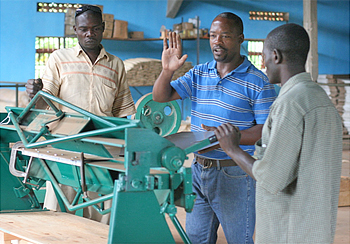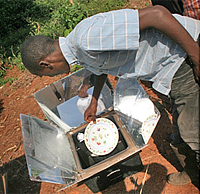Cooking Up New Ideas in Uganda with Solar Stoves
This guest post was written by Nussi Abdullah of FIELD-Support, who was recently in Africa to conduct field visits with African Diaspora Marketplace grantees.
“For many of these women, any source of income will make the difference,” says the chairperson of the Bwebajja Women’s Association. With 45 members, this informal group represents women in the little village of Bwebajja, tucked away off the main road to Entebbe in Uganda. It’s hard to believe that we are mere kilometers from the bustling capital city of Kampala; the dirt road that runs between the small half-finished homes is so bumpy our car gets stuck more than once in the mud.

We’re visiting Bwebajja with Ronald Mutebi, a dynamic entrepreneur and co-founder of Sun Tek Consults, one of 14 winners of the USAID- and Western Union-funded African Diaspora Marketplace (ADM), which is managed by FHI 360 through the FIELD-Support LWA. Sun Tek is establishing itself as a local distributor of Sun Oven’s solar cookstoves, which can truly revolutionize the lives of so many low-income families, such as the ones living in Bwebajja.
In October 2010, the Association was granted one of Sun Oven’s industrial-sized village solar cookers through Rotary International, with Mutebi’s help. The women now use the oven to bake cakes that they sell in the market. “At Christmas time, the supermarket ordered 1,000 cupcakes!” she tells us excitedly, "all of the women gathered, some were preparing the dough, some were decorating.”

We’re here today because Mutebi plans to introduce the women to the smaller model of the cookstove, the household version which the women can use to cook their daily meals. Some households can spend up to 35,000 shillings (US$15) each week on charcoal for cooking; for those who can’t even afford that, it’s hours of collecting firewood from farther and farther away in these increasingly degraded landscapes. The solar stoves have a 10-year guarantee and even at $150 each, pay for themselves very quickly. Aside from the economic benefits, explains Mutebi, the stoves save the women time in cooking (it takes half the time as charcoal), they preserve the environment (no fuel wood needed at all), and it’s better for their health (smoke inhalation is a serious risk for the women and their families).
“I plan for my experiences establishing this business here in Uganda to empower SMEs in Uganda,” says Mutebi about his other primary motivation behind the venture. He believes in the power of the private sector to really lift Uganda, especially through investment from Diaspora members, like him. His assembly factory in Kampala (built with matching funds from ADM) officially opens at the end of this month, and with more 1,000 stoves already in use throughout the country and linkages lined up with scores of other buyers, he’s ready to take it to the next level.


